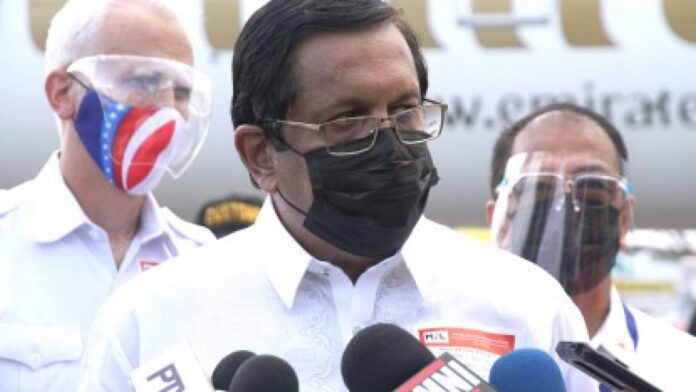Despite the threat posed by the Omicron Covid-19 variant, the World Health Organization (WHO) on Tuesday said “it is still premature to reintroduce the face shields” with the “significant public discontent” on its mandatory use.
At the Laging Handa briefing on Tuesday, WHO Country Representative Dr. Rabindra Abeyasinghe said the mandatory use of face shields is not yet recommended amid the possible entry of the new Omicron coronavirus variant in the country.
“WHO has right along said that this is a virus that is not airborne, right? It’s close contact transmission and that is why we emphasize that what is important is the physical distancing and the face masking and the hand hygiene,” he said.
Abeyasinghe gave much emphasis on strict adherence to social distancing policy as the dreaded virus can be transmitted through close contacts, not by air.
“So, I think it will be premature now to go there and say we need to reintroduce face shields because we also know that there is significant public discontent on the mandatory use of face shields,” Abiyasinghe said.
“So it’s better to get public compliance with the measures that are there and data risk-based approach to reanalyze whether we need to go into the use of face shields or not,” he added.
Abiyasinghe said while the mandatory face shields rule is still being studied, the public should have strong compliance to the minimum public health measures.
“If we can ensure that people don’t congregate in closed settings, the requirement for face shields probably at this point of time is not mandatory because as I said, we are still looking at understanding the transmission dynamics of the Omicron variant,” he added.
Abeyasinghe noted that the country must be prepared and recognize the threat caused by the “heavily mutated” Omicron variant.
“We are conscious that we don’t have a lot of information right now about the potential transmissibility, the potential possibility of infections, or even its capacity to evade the therapeutics and vaccines that we have,” he added.
Abiyasinghe said the WHO supports the alert level system being imposed by the Philippines.
“We need to manage the risk of Covid-19 without harming the economy and protecting lives. And so, the transient from the quarantine classifications to the alert levels which allows to greater economic activity is welcome and we support that, and we need to be very careful in monitoring the situation for all potential presence of Omicron in the country,” he said.
He said there is a need for stringent measures at points of entry and monitor the whole-genome sequencing to detect the presence of Omicron virus, particularly those Filipino returnees from Southern African countries.
“I would go to say that we should not be looking from Omicron only countries that have confirmed the virus for now because there are many countries that the virus may be there, the variant may be there but have no capacity for sequencing,” he added.
He then recommended an immediately conduct whole-genome sequencing to those positive cases entering the borders, whether returning Overseas Filipinos or foreigners.
“Of the recent detection of the variant, we need to rapidly do genome sequencing of the most recent arrivals,” he said.
Abiyasinghe said the government must support the Philippine Genome Center in expanding its whole genome sequencing capacity for early detection of Omicron variant and to initiate appropriate control measures. (PNA)


